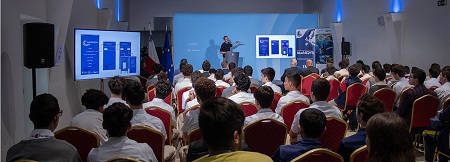
Register with Plumtri!
Register on plumtri as an Individual or as an Organisation to gain access to all of its useful features and remain updated on the latest R&I news, events and funding opportunities.
-
 Welcome to plumtriA platform for Research & Innovation
Welcome to plumtriA platform for Research & Innovation -
 Looking for Funding?Check out the current open calls
Looking for Funding?Check out the current open calls -
 Register today to start receiving our monthly newsletter
Register today to start receiving our monthly newsletter -
 Looking to partner up?Search our list of registered profiles
Looking to partner up?Search our list of registered profiles -
 You have questions on a particular funding programme?
You have questions on a particular funding programme?
Become a researcher whilst on the beach this summer! Project ANDROMEDA

Citizen science programmes have revolutionised in recent years the collection of scientific data in the field, allowing scientists to monitor natural phenomena or a human activity round the clock whilst inspiring and informing contributing members of the public.
The Oceanography Malta Research Group (OMRG) within the Department of Geosciences at the University of Malta has today launched ANDROMEDA, a microplastics citizen science project, a campaign through which information on the density, size, colour and type of microplastics being recorded by bathers along selected Maltese beaches is collected in real time, during an outreach event held at Esplora Interactive Science Centre in Kalkara.
The event was opened by Prof. Alan Deidun, Principal Investigator at the University of Malta on the ANDROMEDA project and Ocean Ambassador for Malta and saw the intervention of MCST Chairman Dr Tonio Portughese, Parliamentary Secretary for Fisheries Dr Alicia Bugeja Said and Parliamentary Secretary for EU Funding Dr Chris Bonett. The event was attended by over 100 Secondary School students hailing from three different schools, who were given the possibility of touring the Esplora facilities, of engaging with the latest research tools on microplastics (e.g. hand-held NIR spectrometer) at the University of Malta and with the digital ocean literacy tools (e.g. humanoid tools, VR headsets, hologram) delivered through the CORALLO project. Dr Adam Gauci, IT specialist and resident academic at the OMRG, Mr Ede Kossari-Tarnik, MSc student at the University of Malta and Mr Andrew Schembri from the environmental NGO Zibel, also made presentations during the event, on ongoing national research and campaigns revolving around marine litter and microplastics. For this event, German Ambassador to Malta, Mr Walter Haßmann, and other representatives from the French Embassy, were present.
OMRG already runs two citizen science campaigns – the Spot the Jellyfish and the Spot the Alien Fish ones – on a national basis.
The Chairman of the Malta Council for Science and Technology Dr Tonio Portughese said: “We are always keen to support international collaboration and are pleased by the interest shown by the local research community to engage and take up opportunities such as this, to work with the best minds in various sectors, hailing from first-class facilities and infrastructures beyond our shores.”
The ANDROMEDA microplastics citizen science campaign will be largely administered through an innovative smart phone application, which in Principal Investigator Prof. Alan Deidun’s words, is the first one to fully integrate Artificial Intelligence (through image analysis) with citizen science. A mathematical algorithm which is embedded within the ANDROMEDA smart phone app applies Machine Learning Protocols, namely in the form of image analysis, so as to extract a variety of parameters (e.g. colour, size, surface roughness) from the photos of the extracted microplastics submitted by the public from beaches through their mobile phones. This app was developed by Dr. Adam Gauci and Prof. Alan Deidun, with such a finding being reported within the Ocean and Coastal Management journal in 2019. The same app will be freely available for download on Android and iOS phones in the coming weeks and can be used on any European beach. One can read more about the ANDROMEDA project through ad hoc factsheets, available digitally. Although the smart phone app can be used on any beach in Malta, visitors to the Golden Bay and Ghadira beaches this summer can participate in the ANDROMEDA citizen science campaign by approaching MTA beach supervisors on site, who will pass on microplastic sand extraction kits consisting of a sieve, quadrat, shovel and ruler. Hopes are that app usage will pick up eventually, so that reports are submitted to the University of Malta from different European coastlines.
The ANDROMEDA project aims to improve current methods of collecting microplastic samples from marine environments and to develop new methods and tools to analyse microplastics found in order to better understand the source, locations and characteristics of these plastic particles. Researchers also want to better understand how these microplastics degrade and breakdown in our oceans and seas. ‘The University of Malta, one of the partners in the project ANDROMEDA, is funded by the Malta Council for Science and Technology (MCST) through the JPI Oceans Joint Action Sources, distribution & impact of microplastics in the marine environment call’. The event at Esplora was mainly funded through the BlueNights project, funded within the Horizon Europe framework and within which the University of Malta is also a partner through the Oceanography Malta Research Group (OMRG).
